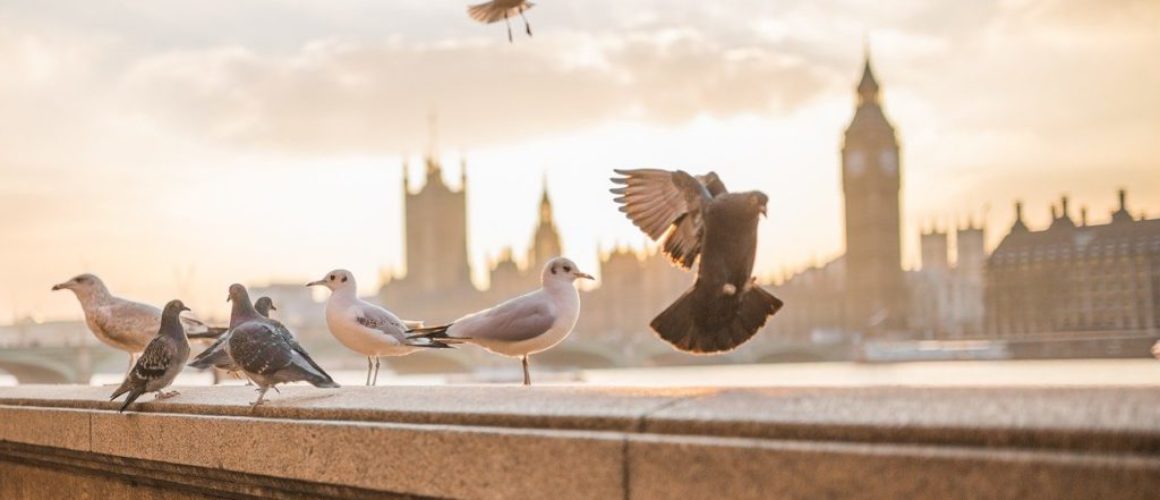Top five best bird deterrents
Statistics have shown that since 1960 the urban population of the UK has grown by 14.81 million, while the rural population has shrunk by around 370 thousand. As people have migrated to more urbanised areas, so have ‘pests’ such as mice, rats and, in this instance, birds. Birds such as pigeons and seagulls have increasingly been seen to nest in these areas that offer more regularly available food sources, causing an array of problems.
All wild birds in the UK are protected under the Wildlife and Countryside Act 1981, which means once a bird has nested, it is difficult to remove them. Fortunately, there are alternative methods to deterring birds from your site.
In this article, we will discuss the effectiveness of predatory birds as a deterrent, the top five deterrents and how to tell if you need bird control.
Are birds good for pest control?
Birds of prey are regularly used as a greener, humane and more effective means of pest control in urban spaces. Falcons and hawks are particularly effective and are generally seen as the best birds for pest control. Their predatory nature helps to disperse any pest bird species from the area quickly and efficiently. Bird control specialists work with these predatory birds, flying them over a designated site multiple times to alert all pest birds in the area to their presence. They will mimic their natural hunting patterns throughout the time they are on-site without killing or injuring any birds. Any bird roosting or nested in the area will see that it is no longer safe to remain here and will quickly leave, moving to a more appropriate site.
These predatory birds are incredibly useful in safely moving other birds away, and often they will be encouraged to leave if they see these threats before they’ve even taken flight. If you have a large site such as a new development space, a warehouse, stadium etc., these predatory birds are the ideal form of pest control.
Which are the top five best bird deterrents?
There are a number of safe, effective and legal ways of deterring wild birds from roosting and nesting on your property, here we have listed our top five.
Removing Food Sources
Birds seek out two things; food and shelter, which is why one of the best deterrents is to remove any food sources in the area. Pest birds such as pigeons are notorious for feeding off the ground, which is why ensuring there are no food sources available on the floor is key. By investing in more secure bins and regularly cleaning your property, you can help keep pest birds away.
Audio Visual Deterrents
Bird proofing specialists frequently use a combination of lasers and acoustic scarers as an effective way to deter birds from a site. AV deterrents are often placed where there has been a notable increase of birds roosting or even nesting and can be motion activated. Once a bird approaches your property, the AV deterrent will activate, encouraging them not to return.
Structural Deterrents
One of the most frequently used bird deterrents has always been to alter your property structurally. The addition of netting, parallel wires, bird spikes and bird gels on roofs, eaves and ledges are effective and humane ways to keeping birds away. Gutter guards are also valuable additions to guttering as this is often the perfect spot to nest with access to nest materials and freshwater. These physical barriers ensure that birds physically cannot land on your property, and if they do, they won’t be in a hurry to return.
Property Upkeep
Maintaining your property is essential for keeping birds away as they tend to nest on roofs and guttering that are covered in leaves, dirt and other debris that makes for ideal nesting materials. Ensuring that there are no cracks or holes for birds to nestle into and having your gutters regularly cleaned is the best way to deter unwanted birds.
Falconry Deterrents
When working with a property that is too large to benefit from the aforementioned bird deterrent methods, falconry deterrents are the best option. With the help of a professional pest control team, these natural predators are the best birds for pest control; they quickly and swiftly move across sites, alerting pest birds to their presence and moving them away.
When do you need bird control?
You should look out for several signs that will indicate whether or not you have a bird pest problem on your property. Here we have listed some of the most common indicators:
∙ An increase in bird droppings on or around your property: This not only doesn’t look great, but the uric acid in the dropping can erode your property and be harmful to human health.
∙ An increase in bird noises: This can often signify birds nesting with newborn chicks calling their mother from the nest.
∙ An increase in birds of the same species on or around your property: This can be a key indicator that they have found an ideal place to nest, and as a result, more birds are being encouraged to stay in the area.
Are you looking for bird control experts?
If you suspect a bird infestation on your property and would like to know more about how best to manage the situation, feel free to visit our Bird Control Solutions page.
With over 25 years of experience in the field, our team of highly trained technicians specialise in commercial pest control, including bird proofing, falconry deterrent and nesting bird solution.
If you have concerns about birds nesting on your property and would like advice and assistance, don’t hesitate to get in touch with us today on 0151 345 6854 or email us at info@urbanhawks.co.uk. Our team are more than happy to assist you and advise you on the best course of action.

